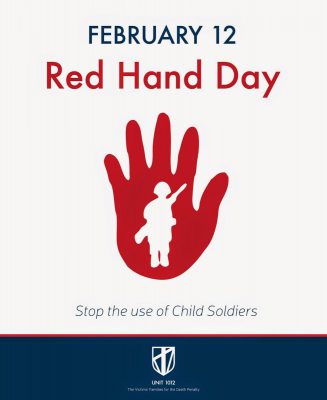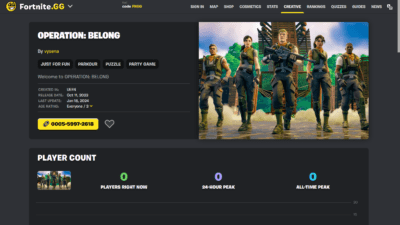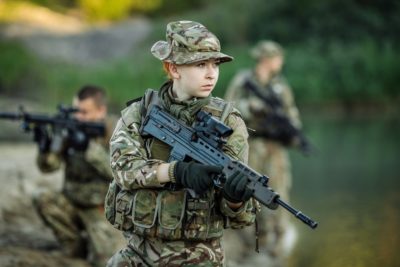A red hand against child soldiers – the UK should be leading the way not dragging its feet
ForcesWatch comment

ForcesWatch are part of the “Zero under 18” or the #MakeIt18 campaign, which aims at the universal ratification of the UN’s Optional Protocol on the Involvement of Children in Armed Conflict.
Although the UK has ratified this treaty, and although we do not deploy soldiers until they are 18, we are under heavy human rights and child right based criticism for continuing to recruit from 16.
In 2016, the UN Committee on the Rights of the Child (UN CRC) reviewed the UK’s implementation of the Convention on the Rights of the Child (CRC) and made a number of important points which we are still bringing to the attention of the UK government today.
Areas of concern raised by the UN CRC were:
- The State party maintains the wide scope of its interpretative declaration on article 1 of the Optional Protocol, which may permit the deployment of children to areas of hostilities and their involvement in hostilities under certain circumstances;
- The minimum age for voluntary recruitment as 16 years has not been changed and child recruits makes up 20 per cent of the recent annual intake of United Kingdom Regular Armed Forces;
- The Army Board endorsed increasing the recruitment of personnel under 18 years old to avoid undermanning, and children who come from vulnerable groups are disproportionately represented among recruits;
- Safeguards for voluntary recruitment are insufficient, particularly in the light of the very low literacy level of the majority of under-18 recruits and the fact that briefing materials provided to child applicants and their parents or guardians do not clearly inform them of the risks and obligations that follow their enlistment;
- In the army, child recruits can be required to serve a minimum period of service up to two years longer than the minimum period for adult recruits.
And the recommendations made by the Committee were that the UK:
- Consider reviewing its position and raise the minimum age for recruitment into the armed forces to 18 years in order to promote the protection of children through an overall higher legal standard;
- Reconsider its active policy of recruitment of children into the armed forces and ensure that recruitment practices do not actively target persons under the age of 18 and ensure that military recruiters’ access to school be strictly limited;
- In recruiting persons under the age of 18, strengthen its safeguards required by article 3 of the Optional Protocol, in order to ensure that the recruitment is genuinely voluntary and based on fully informed consent of the recruit and their parents and legal guardians, and ensure that recruitment does not have a discriminatory impact on children of ethnic minorities and low-income families;
- Ensure that the minimum period of service applied to children who enlist into the army is no longer than that applied to adult recruits.
The UK is flying in the face of each recommendation made by the UN Committee on the Rights of the Child. It continues to recruit under the age of 18, despite evidence that early enlistment is connected with detrimental health outcomes and long-term deprivation.
It continues to actively target under 18 year olds through marketing campaigns and recruitment activities in schools, which are neither adequately balanced nor scrutinised. It is actively targeting low-income families and children of ethnic minorities as a matter of policy, and manipulative, glamourised and targeted marketing campaigns undermine voluntary informed consent.
Raising recruitment to 18 and achieving a higher legal standard protecting children would be no small thing.
It would set an example to other countries who have yet to protect children from involvement in armed conflict. It would place greater incentive on minors thinking of enlisting into the military, and their educators and caregivers, to gain better and further qualifications beforehand, which would greatly enhance their social mobility prospects.
It would mean that those enlisting into the military are more informed and more mature, and can therefore make a more genuinely voluntary and committed decision.
It would mean that those in military training would be more mentally and physically robust to withstand intense training without long-term negative health consequences. It would mean the military would no longer be able to fill up front-line combat roles with the youngest and most vulnerable recruits so easily.
It would give the military more incentive to focus on improving conditions for personnel and therefore having greater retention to mitigate recruitment shortfalls.
It would safeguard minors from being part of a culture which has proven itself repeatedly to lend itself to systematic abuse.
It is unacceptable that those teenagers who found themselves away from home, probably for the first time, were abused by adults who will not face a normal civilian trial for this abuse. It is unacceptable that those teenagers were soldiers in the first place.
The abuse of minors in the military is in the public eye due to the Army’s largest ever abuse case, which begins today.
16 instructors from Harrogate, where the Army’s youngest recruits go to train, are facing a military trial for charges including hitting and slapping teens in the face, shoving manure into their mouths and plunging their heads under water.
The military is conducting its own trial and disallowing the media from reporting on anything said in court, until it is over. Meanwhile its recruitment campaigns and self-promotion portray itself as an inclusive, friendly, supportive employer for children and young people.
It is unacceptable that those teenagers who found themselves away from home, probably for the first time, were abused by adults who will not face a normal civilian trial for this abuse.
It is unacceptable that those teenagers were soldiers in the first place, which would happen nowhere else in Europe (except Belarus, from 17) and for the sixteen year olds, in no other member state in the UN Security Council.
Yet it remains extremely difficult to challenge this status quo in political circles, where any challenge to the military is highly controversial. Three parties have made raising recruitment to 18 their policy: the SNP, Plaid Cymru and the Green Party. Each other political party should listen to the recommendations made by the UN CRC and join them.
We need to push for a higher legal standard and we need to work towards a political culture that is mature enough for the military and its systems to be justly criticised and reformed.
See more: recruitment age, risks,
Like what you read?
> Sign up for our newsletter or blog notifications
> Support our work – from just £2 a month










